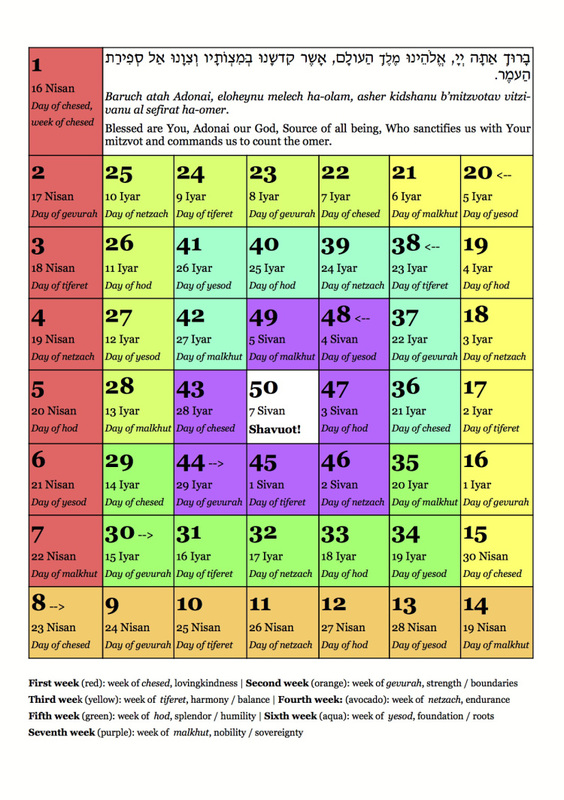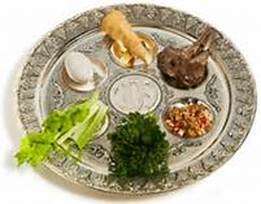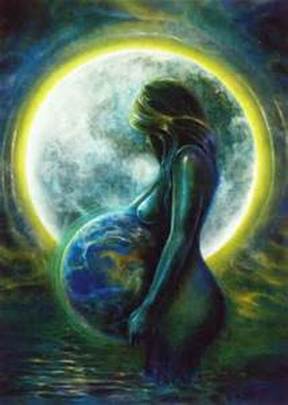|
Each of the seven weeks between the holidays of Passover and Shavuot, the festivals of Liberation and Revelation, are said to be channels for the seven lower s'firot of the Tree of Life- the seven Divine qualities. In addition, the seven days of each of the seven weeks also embody the same seven qualities. Therefore, each of the 49 days (7 days x 7 weeks) has its own unique permutation Rebbe Nachman of Bretzlov teaches: “Know, that whatever people speak about during the days of S'fira, they are only talking about the S'fira of that day. People who understand are able to hear and know this, and if they will pay attention well to what people discuss, they will hear them talking only about the S'fira of that day...” -Likutei Moharan I, 182 Rebbe Nachman is saying that if you listen closely, you will see that everyone around you is talking about the particular permutation of the particular day. A fascinating claim! Is that really true? Are people going around talking about whatever they're talking about, and yet unbeknownst to them, the particular s'fira permutation of the day is influencing their thoughts and words? Actually, to go down this road of inquiry is to miss the point. There's another profound opportunity for inquiry that comes from this teaching: If you begin with the idea that everyone around you is talking about the sefira of the day in veiled terms, and you want to discover the hidden meaning of what they're saying, what does that lead you to do? It leads you to listen very very carefully! It leads you to be present- to keep your mind in the shape of this question: "What's really going on?" When you do that, you may not get an answer. With the practice of inquiry, the answer isn't really the point. It's the shape of your mind that's the point. When your mind is shaped like a question mark, it is open, curious, receptive- very different from a mind that already knows the answer, shaped like a period or exclamation point. So, this S'firat HaOmer period can be wonderful practice of inquiry. You can even do this practice without even knowing the Hebrew terms and Kabbalistic concepts. Simply ask inwardly each of the 49 days- what is the quality of this day? What is shining from everything that's arising in this experience? Then, just notice. If revelation comes, wonderful, but it's not the point. Counting is the point- meaning, noting and asking into the uniqueness of this moment. Shabbat Shalom, Ma'adim L'simkha- Good Times! P.S. If you do want to learn about the Hebrew terms and Kabbalistic concepts, here's some info: The Seven Sefirot and the "Middah" or spiritual quality associated with them: Hesed- "Loving Kindness" (Middah is also Loving Kindness) Gevurah- "Strength" (Middah is also Strength, particularly drawing boundaries) Tiferet- "Grace/Beauty"- Middah is Compassion. Netzakh- "Victory" or "Eternity"- Middah is Persistence, Not-Giving-Up. Hod- "Majesty" or "Glory"- Middah is Gratitude, also Humility. Yesod- "Foundation"- Middah is Connection, Empathy, Intimacy. Malkhut- "Kingdom"- Middah is Trust, Faith. Here is a cool chart I found for seeing how the S'firot permute for all 49 days, along with instructions for the counting of the Omer, which is done in the evenings. This year, the first day (16th of Nisan on the chart) was Saturday night, April 23rd. (There's a little typo however- the final day in the middle, the holiday of Shavuot, begins on the 6th, not the 7th, though it extends through the 7th outside the land if Israel.) For more info on how to do the daily Omer counting ritual with the dates for this year 2016 (5776), here's a useful link I found- Click Here
There are also tons of apps available nowadays for counting the Omer.
0 Comments
One Passover, Rabbi Levi Yitzhak of Berditchev led the first night seder so perfectly, that every word and every ritual glowed with all the holiness of its mystical significance. In the dawn, after the celebration, Levi Yitzhak sat in his room, joyful and proud that he had performed such an perfect seder.
But all of a sudden, a Voice from above spoke to him: “More pleasing to me than your seder is that of Hayim the water-carrier.” “Hayim the water-carrier?” wondered Levi Yitzhak, “Who’s that?” He summoned all his disciples together, and asked if anyone had heard of Hayim the water-carrier. Nobody had. So, at the tzaddik’s bidding, some of the disciples set off in search of him. They asked around for many hours before they were led to a poor neighborhood outside the city. There, they were shown a little house that was falling apart. They knocked on the door. A woman came out and asked what they wanted. When they told her, she was amazed. “Yes,” she said, “Hayim the water carrier is my husband, but he can’t go with you, because he drank a lot yesterday and he’s sleeping it off now. If you wake him, you’ll see he won’t even be able to move.” “It’s the rabbi’s orders!” answered the disciples. They barged in and shook him from his sleep. He only blinked at them and couldn’t understand what they wanted. Then he rolled over and tried to go on sleeping. So they grabbed him, dragged him from his bed, and carried him on their shoulders to the tzaddik's house. There they sat him down, bewildered, before Levi Yitzhak. The rabbi leaned toward him and said- “Reb Hayim, dear heart, what kavanah, what mystic intention was in your mind when you gathered the hameitz- the leavened foods- to burn in preparation for the seder?” The water carrier looked at him dully, shook his head and replied, “Master, I just looked into every corner and gathered it together.” The astonished tzaddik continued questioning him- “And what yihudim- what holy unifications did you contemplate when you burned it?” The man pondered, looked distressed, and said hesitatingly, “Master, I forgot to burn it, and now I remember- it’s all still lying on the shelf.” When Rabbi Levi Yitzhak heard this, he grew more and more uncertain, but he continued asking- “And tell me Reb Hayim, how did you celebrate the seder?” Then something seemed to quicken in his eyes and limbs, and he replied in humble tones- “Rabbi, I shall tell you the truth. You see, I had always heard that it’s forbidden to drink brandy on all eight days of the festival, and so yesterday morning I drank enough to last me eight days. Then I got tired and fell asleep. “When my wife woke me in the evening, she said, ‘why don’t you celebrate the seder like all the other Jews?’ “I said, ‘What do you want from me? I’m an ignorant man and my father was an ignorant man. I don’t know how to read, and I don’t know what to do, or what not to do.’ “My wife answered, ‘You must know some little song or something!’ “I thought for a moment, and then a melody and words came to me that I had heard as a child. I sang- “Mah nishtana halaila hazeh mikol haleilot- Why is this night different from all other nights? “I thought, 'why is this night different?' “Then, something strange happened. It was as if I awoke from a dream, and everything was suddenly more real, more present. It was as if the night itself woke up all around me… “Then I looked and saw the table before me, and the cloth gleamed like the sun, and on it were platters of matzot, eggs, and other dishes, with bottles of red wine. So we ate of the matzot and eggs and drank of the wine. “I was overcome with joy. I lifted my cup to the heavens and said, 'Oh Hashem- I drink to you!' “Then we sang and rejoiced in the nishtana- the specialness- of that moment… then I got tired and fell asleep.” So my friends- before you fall asleep! Why is this moment different? On this Shabbat Pesakh, the Sabbath of Passing, may we awaken to know that everything is passing, savoring the unique specialness of this moment. Let the unfolding of Reality become what it will, letting go of whatever it was, and breathing the intention of peace and love and awareness into every thought, every word, every act. Let’s go forth, again, out of mitzrayim- out of constriction- and into the mystery of the Presence as the present. This moment is truly different from all other moments, and always is… A couple sits anxiously in the therapist’s office, unsure how to begin talking about their problems at home. “Why don’t you start,” says the therapist to the woman.
“My husband is a jerk!” she blurts. “Please’” says the therapist, “Only ‘I’ statements. Don’t tell me about him, tell me what’s going on with you. You can start by saying, ‘I feel…’” “Okay,” says the wife, “I feel like he is a jerk!” Differentiating between your actual feelings in the present moment and your impulse to accuse, judge, or blame, is no easy matter when your emotions are inflamed. But making this differentiation is crucial. There’s a world of difference between “I feel like he is a jerk,” on one hand, and “When he comes home late, I feel like I’ve been punched in the stomach...” on the other. The first one is an attack- it’s accusatory. The second one is truthful… and vulnerable, exposing the actual experience of what happens when he comes home late. And of course, if you’re feeling punched in the stomach, the last thing you want is to be vulnerable. You want to attack back, accuse, blame. But ultimately, it’s a self-defeating impulse. Your negative words create an effect, and the ripples of that effect continue on in time. There’s a Jewish proverb of unknown origin- “A bird that you set free may be caught again, but a word that escapes your lips will never return.” This week’s reading also involves setting a bird free. It begins describing the ceremonial purification of a person afflicted with tzara’at- a skin disease that afflicted those who had committed negative speech. “Zot tiyhyeh torat ham’tzora b’yom taharato- “This is the law of the afflicted one on the day of purification…” The ceremony uses two birds, a piece of cedar wood, a crimson thread, and some hyssop. One bird is slaughtered into an earthenware vessel filled with “living waters.” The live bird is then held together with the cedar wood, the crimson thread and hyssop, and dipped into the bloody water. The bloody water is then sprinkled on the afflicted person seven times, and the live bird is set free into an open field. What does this mean? Medieval commentator Rabbeinu Ephraim explains the symbolism of this ritual in transformational terms: The first bird represents negative speech- gossip, slander and so on. This “bird” must be “slaughtered” into an “earthenware vessel.” The vessel represents the “home” of our bodies- fragile, temporary, of the earth. By contemplating the temporary nature your bodily home, you free yourself from arrogance and allow the impulse toward negative speech to be “slaughtered.” The “living waters” represent Truth, which fills the humble “earthen vessel,” once the arrogance is gone. The bird that’s set free represents the disease- just as the bird flies away, so should the disease depart. But, just as the bird might return, so too can the affliction return if you allow yourself to fall back into your patterns of negative speech. Why is it so easy to fall back into negative speech? Why is it so hard to stay present with what you’re actually experiencing, and be nourished by the “living waters” of the vulnerable truth? Because the truth can be painful and ego crushing. And yet, if you constantly project blame and judgment, without fully being with the truth of what you’re experiencing, healing cannot happen. You become the disease- a disease of living on the surface, holding back from your own inner depths, out of fear that your depths are too painful. That’s why tza’arat is a skin disease. It reminds me of the times my family would return to our house after a few weeks of being away. All the windows and doors would have been shut, and there would be a kind of unpleasant smell from the stagnant air, until we opened the windows and doors and let the air flow. That’s what it’s like- your inner world is like a shut up house, festering. But open the doors and windows- speak the truth, and healing begins! As it says in Psalm 30: “Shivati elekha vatirpa’eini- “I cried out to You and you healed me…” This is the true potential of prayer and meditation- to give yourself the space to go into your depths every day, feel whatever needs to be felt there in meditation, express what needs to be expressed in prayer, and tap the renewing and healing power of the Presence that is ever-present. The "living waters" will fill the “home” of your body and renew your spirit. There’s a story of Reb Mordechai of Pintchov, that his poverty was so extreme, he could barely support his household at all. His wife would nag him incessantly to tell their woeful situation to his rebbe, the Seer of Lublin. Time after time he would travel to Lublin, but never once did he mention his troubles to the rebbe, because on arriving there he would forget them completely. Being a practical woman, his wife decided to say nothing more, but to make the journey there by a separate wagon immediately after he had left home. When Reb Mordechai arrived at Lublin, he was confronted by the fact of his wife’s presence. There was no way out- and he told the rebbe all about their state of affairs at home. “Why did you never mention this until now?” asked the Seer. “Rebbe,” answered the hasid, “I assumed that my situation would be known to you through Ruakh Hakodesh (Divine inspiration), through the holy spirit that rests upon you.” “Not so,” answered the rebbe. “It’s true, the Torah says- ‘A person whose skin has the plague of tza’arat shall be brought to Aaron the priest, and the priest shall see the plague.’ “That is to say: As soon the ailing person is brought before the priest, the priest will be able to see the the malady for himself, without being told. “But, in the case of plagues that affect houses, the Torah teaches otherwise: ‘And the house owner shall come and tell the priest, saying: ‘Something like a plague seems to be in the house!’ “From this we see that for plagues affecting houses, one should come before the ‘priest’ and tell him about it!” On this Shabbat Metzorah- the Sabbath of Affliction- may we fully feel and truthfully express our inner afflictions- not with judgment and blame, but as prayers of healing; may we not shrink from the "bitter herbs!" And just as our ancestors tasted the bitterness of slavery before their liberation from narrowness into the Presence, so may it be for us. Good Shabbos!!
I’m reminded of a conversation I once had with my sister-in-law, in which she said she understood the traditional Jewish idea that mothers are exempt from time-bound mitzvot- Jewish practices that happen at particular times, such as morning prayers, for example.
“Why is that?” I asked. “Because mothering can be all consuming,” she replied. “Being a mother is not necessarily good for you. It’s a fire of suffering- the lack of sleep, the constant neediness of the child. But, it’s a suffering of love, a fire of love.” Her words made me think of the two kinds love as explained in the classic work of Kabbalah and Hassidic philosophy, the Tanya. According to the Tanya, the first kind of love happens when you experience the Divine as your very own life force. Since people naturally love their own life, seeing God as your own life force means that you love God just as you love your own life. In fact, the two are not separate; you love God as your own beingness. The second kind of love happens when you experience God as your parent. The Tanya talks about the example of certain children who love their parents so much, they’re willing to sacrifice their lives for their parents. The first type of love is non-dual; God is not something separate from your own being. The second type is dualistic; God is separate from me, even possibly negating me if I sacrifice my life. Which one is higher? You might think the non-dual one is higher, that it’s more authentic to see yourself as not separate from the Divine. However, the Tanya says otherwise. It goes on to explain that when you know the Godliness within, there is a pleasure, a spiritual bliss that comes with being in touch with your own inner Divinity. But, if you see God as separate, and you’re willing to give up your very life for God, that’s far more transcendent and selfless. When my sister-in-law was talking about the all-consuming love of mothering, she was basically talking about the Tanya’s self-sacrificing love, except it was inverted- rather than the rare child that would sacrifice its life for the parent, this was the very common example of the parent who’s constantly sacrificing her life for the child! Which brings us to this week’s reading, Parshat Tazria: “Ki tazria v’yalda zakhar- “When a woman conceives and gives birth to a son, she is ritually un-fit for seven days- like the days of her menstrual separation, she is ritually un-fit…she shouldn’t touch any holy thing, and into the holy she shall not come…” It’s talking about how a woman who gives birth shouldn’t touch sacred things or come into the temple for a certain period of time. Let’s look more deeply at what this is talking about: The word for “holy” is kodesh, which means separate. However, it means a special kind of separate. It doesn’t mean separate as distant or removed, but rather as central and exclusive. For example, where is the holiest place? It’s not some distant site outside the camp. It’s the very center of the camp, in the very center of the Sanctuary, in a special room where the priest goes once per year to be in special intimacy with God. Similarly, the intimacy of marriage is also a “holy of holies”. It is holy in its unique togetherness, holy because of the closeness that happens there. So kodesh doesn’t exactly mean separation, but really means “separation from all separation.” It means separateness in that it’s the closest, and therefore separate from all other things that are less close. The menstrual period is considered a time of nidah, which also means “separation”. During this time there is traditionally no sexual intimacy, no kodesh, no “separation-from-all-separation”. Nidah, therefore, really means “separation-from-the-separation-from all-separation”. These two states, Kodesh and Nidah, really parallel the two kinds of love- love of the Divine as your own self (Kodesh) and love of the Divine as your own parent- or, as many of us have experienced, as your own child (Nidah). Seen in this way, the opening of the parsha is really describing these two kinds of love and service. The new mother is in a state of Nidah because she’s not concerned with the experience of Divinity in her own being; she’s completely at the service of the newborn. This is itself a swing of the pendulum because she just gave birth- and what could be more Godly than giving birth? Her own body just created another living being. She is a Goddess- a Creator. And now she swings from Goddess to servant, burning in the painful love of motherhood. But this does not- and cannot- go on forever. She’s in a Nidah-like state only for a short time. Then she returns to connection with the Kodesh. She must do that, because to be only in the selfless service of another would be self-destructive, and therefore destructive to the baby as well. In one way or another, life brings us between these poles- sometimes being an Eved Hashem- a servant of God, devotedly (or sometimes drudgingly) giving of ourselves, not “getting” anything out of it. Other times, we are B’tzelem Elohim, manifestations of the Divine, enjoying the renewal and bliss of the Divine energy that is our essential nature. Even in our Avodah, our daily spiritual practice, these two poles exist. Sometimes there’s a palpable flow of blissful connection with the One- and the One is not other than our own being. But sometimes, that connection is not felt, and your commitment to your Avodah must come from a deeper motivation- one of service. That’s why the prayer that happen in synagogue is called a “service.” You may not feel like you’re getting much out of it, but you do it because you’re devoted, because you’re committed. These two poles even manifest in the two main forms of Avodah- meditation and prayer. In the stillness of meditation, the Completeness of the present moment is not something other than your own being. But in the fire of prayer, the self’s longing for Completeness reaches out for help from That which is infinitely greater than the self. Yet there comes another point- perhaps that point is now- when these two poles meet, when they’re not separate at all, when the fire of love and service is the very thing that opens the door to your own inner Divinity. It’s said that once the Baal Shem Tov heard a Bat Kol- a Heavenly Voice- tell him that for some little sin he had committed, he would be denied life in the World to Come. When he heard this news, he began dancing for joy. The Voice then asked, “Why are you so happy? I just said you will have no life in the World to Come!” The Baal Shem replied, “I dance because now I am free to serve God for it’s own sake, without ulterior motive.” On this Shabbat Tazria, the Sabbath of Conception, may we deeply realize this paradox of Being God and being a servant of God, and may we fall into this Shabbos as a child falls into her mother’s arms. And, may all mothers find the time and support to renew in the bliss if the Kodesh, and may we give that support when it is needed! Amein, Selah! |
Archives
July 2024
|





 RSS Feed
RSS Feed